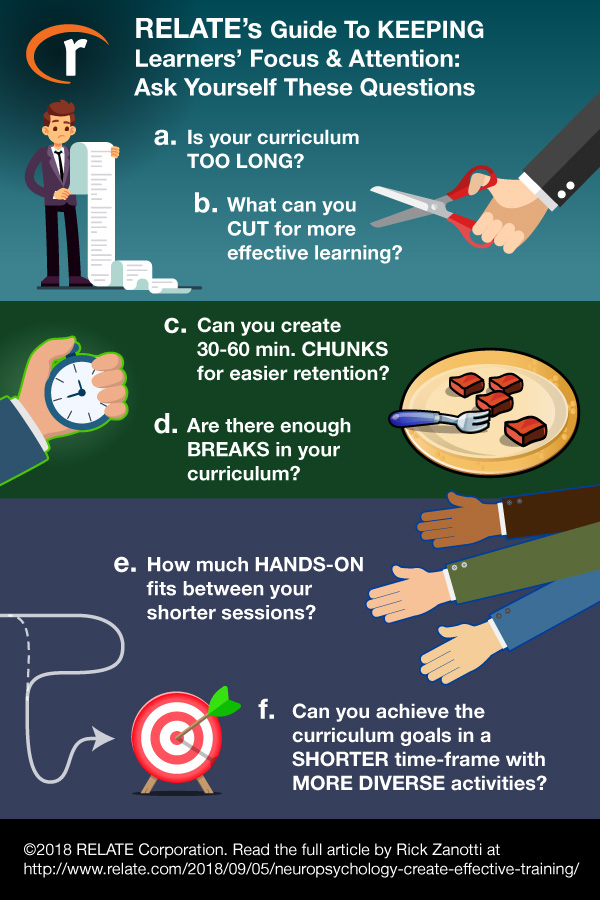Some points of interest, especially for those in Learning & Development:
1. Our Brains Work Best Early: Tackle The Hard Stuff First!
 Our brains are most active in the morning, when we have the most energy in our oxygen and glucose levels. We're more awake and ready to take on the challenges of the day... As Dr. Vishton says, we should take on the hardest tasks right from the get-go. If we wait too long, our energy reserves drop and those tasks now become much more draining on our oxygen- and glucose-starved brain later in the day...
Our brains are most active in the morning, when we have the most energy in our oxygen and glucose levels. We're more awake and ready to take on the challenges of the day... As Dr. Vishton says, we should take on the hardest tasks right from the get-go. If we wait too long, our energy reserves drop and those tasks now become much more draining on our oxygen- and glucose-starved brain later in the day...Are Courses in Education / Training Designed Backwards?
This brings up the idea of curriculum development in most corporations, agencies and military classrooms. Are we training the most difficult subjects first or way later in the day or week, when the brain is near coma levels?
When I used to train relational database tuning and design, the course materials I had were really easy up-front. Then, as the day, or days in some classes, wore on, the material became increasingly more complex. I used to wonder why the class was so sleepy in the afternoon. Why was it so hard to bring them back to the classroom with an alert brain?
Now it makes sense to me. The curriculum was designed to do easy first and hard at the very end, when no one had any mental oomph left to give (not to mention how the poor instructor was tired too)...
In many corporations, curriculums are developed in the same manner: easy first, hard at the end. Talk about trials and tribulations! This is hard for the teachers and let's not even talk about the poor students who are on total overload in many long, multi-week curriculums.
Optimal Training Design with the Brain in Mind
It would make so much more sense to break classroom sessions into 30-60 minute pieces. Then go one-on-one, into labs, more breaks, etc. before returning to the classroom. In fact, the longer the day, the more breaks should be given. I can verify from classes I've taught that more breaks later in the day are not only welcome but necessary...
Have you looked at your curriculum lately? Ask yourself these questions:
a. Is the curriculum too long?
b. How can you shorten the curriculum to make it more effective?
c. Can the courses/lessons be chunked into more bite-sized pieces for easier digestion by the brain?
d. Are there enough breaks given throughout the day to ensure brain activity at the end of that same day (remember, they have to drive home usually, alert!)
e. How much hands-on can be done between shorter lecture sessions?
f. Can the curriculum goals be achieved in a much shorter time-frame with more diverse classes (i.e. diverse activities, things to do)
There are many more questions you can ask but this is a good start. You can use the graphical guide below to keep these prompts handy as you design/refine your curriculums:

For more discussion on how to develop more attention-grabbing courses, you can also read my article on design mistakes that make eLearning boring.
2. Neuropsychology Findings on Memory & Gaming
Dr. Vishton also commented on memory and gaming... Whoa, wait!!! Nothing could be wrong with gaming now, could there be?
It turns out that gaming, especially when playing more repetitive, arcade-like games, definitely affects short-term memory in adverse (and sometimes positive) ways.
Can Gaming Worsen Memory by Dulling Emotion?
As I've discussed before, emotions play a leading role in learning. And playing games can reduce the emotional intensity of your life experiences, for better or for worse.
For example, if you go on a first date and feel incredibly happy after a first kiss, going home and playing Tetris, or some other similar game, could erase most of the impact of that first kiss or date.
It deadens the emotions, and the more engaged with the game you are, the more you will forget or deaden that emotion. You could even forget large parts of your recent experiences or the emotional impact those moments had...

On the other hand, you're driving home and see a car crash with a person on the ground covered in blood, dying... Uggh, not a good memory at all! And yet, if you go home and play Tetris to forget the emotional trauma of what you just saw, the impact of the crash scene will diminish incredibly.
The end conclusion is that gaming screws our minds over when it comes to memory, good or bad. From studies I've done years ago what happens is that brain grooves and goes into loops. Less connections are made and the person in that groove is less capable with language and cognitive skills. Games can literally addict gamers' brains and make them highly unproductive. Not all people will react that way, but many will...
Does Gaming Really Impact Classroom Learning?
If your students are in a full day class then go home and play hours of a game, much of what was learned in the class could be diminished. If you don't believe that, just look at the randomicity of answers provided by students everywhere nowadays... It's kinda scary and corporations spend a lot of money training people who routinely un-train themselves...
Remember, gaming appeals to pleasure centers in the brain and less to areas like the frontal lobes where the executive functions lie...Pleasure and impulsivity tend to go hand in hand...
Conclusions: Analyze Your Training with Neuropsychology
I've already covered some conclusions about the two examples given. There are so many other ways to look at training if we look at it from a neuropsychological standpoint. This area of Psychology can be more easily quantified scientifically, unlike the more complex psycho-emotional sub-disciplines.
The best thing to do is to analyze the training as it stands in your organization. Break it into more pieces, smaller ones at that, and put them back together into a different order. Maximizing some of the principles we talked about could make a huge difference in how we learn and how we produce.
Please leave some of your ideas and comments below and let's start a conversation. Thanks!
Having Trouble with Course Design?
Also, if you need more advice on course design or any other assistance on your Training & Development projects, we're here to help. Give us a call at 1-800-428-3708, send us an e-mail at connect@relate.com, or fill out our contact form to learn more about what we can do for you.
No comments:
Post a Comment